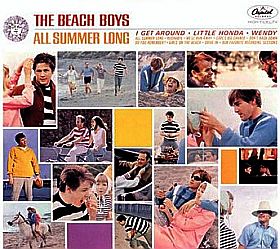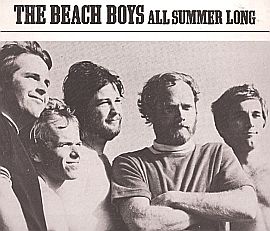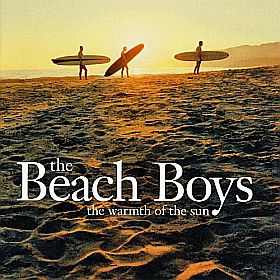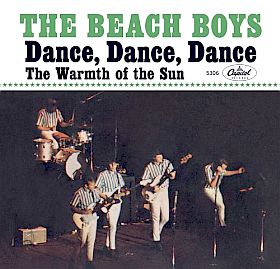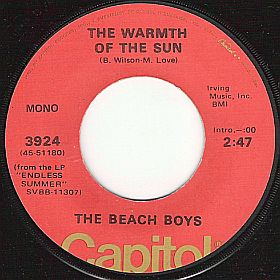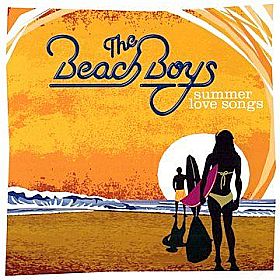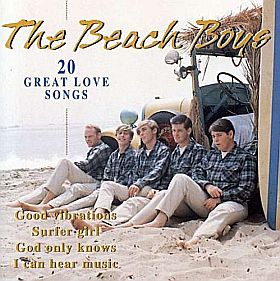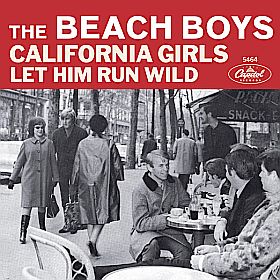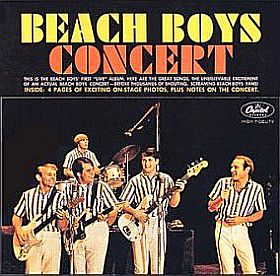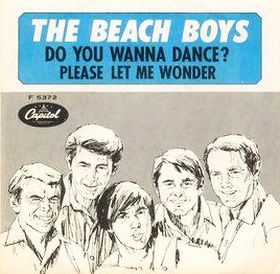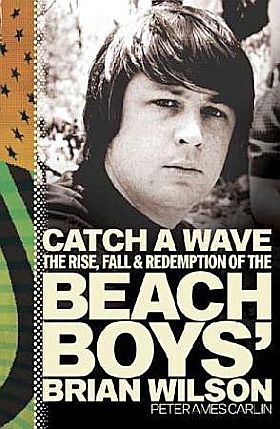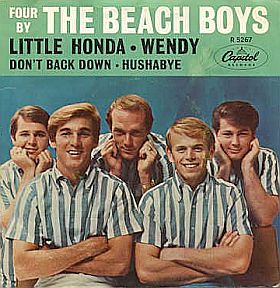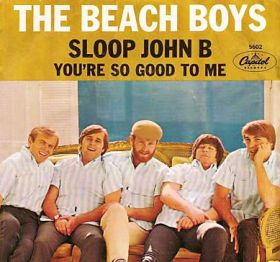
1960s photo of Beach Boys on 2005 “best of” compilation album, featuring “Ten Best” songs. Click for CD.
Initially, the group was comprised of three brothers — Brian, Dennis, and Carl Wilson — plus cousin Mike Love and friend Al Jardine. They became one of the hottest and most successful groups of the 1960s, credited with inventing “California rock” and “sunshine pop” — and along with the Beatles — pushing the envelope on a new and imaginative front of songwriting and musical arrangement.
What follows here is Part 2 of a longer companion article that explores the Beach Boys’ early music and their history. This piece focuses on six of their songs from the 1963-1966 period. The full versions of all six songs are offered below in self-contained music players. They provide good examples of the Beach Boys’ early sound, featuring exceptional harmonies and good production values. The songs also serve as historical windows into the Beach Boys’ talents and biography during the 1963-1966 period. Subjectively selected, these six songs are meant as a Beach Boys’ sampler, and readers are encouraged to visit Part 1 of this article for further background and introduction, and also to explore Beach Boys’ music beyond these six offerings.

The Beach Boys mid-1960s, from top left clockwise: Carl Wilson, Mike Love, Dennis Wilson, Al Jardine & Bruce Johnston.
Between 1961 and 1988, they turned out thirty-six Top 40 hits, more than any other U.S. rock band. They also produced 56 songs that charted in the Top 100. Four of their songs were No. 1 hit singles.
Rolling Stone placed the Beach Boys at No.12 on the magazine’s 2004 listing of “The 100 Greatest Artists of All Time.” New compilations of Beach Boys’ music have appeared as recently as 2009. Currently on Amazon.com there are more than 100 offerings of various Beach Boys’ recordings.
Here below, are six of their songs from the 1963-1966 period: “In My Room” (1963), “Don’t Worry Baby” (1964), “All Summer Long” (1964), “When I Grow Up” (1964), “The Warmth of The Sun” (1964), and “God Only Knows” (1966).
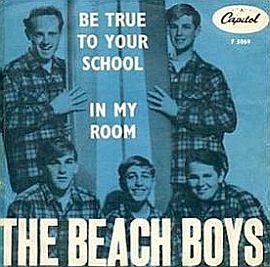
Cover sleeve for Beach Boys singles “Be True To Your School" & "In My Room". Click for digital 'Be True...'.
Sept-Oct 1963
“In My Room”
In September 1963, with the Beach Boys’ third album Surfer Girl, one of the songs included was the Brian Wilson tune, “In My Room,” co-written with Gary Usher.
Music Player
“In My Room”-1963
“In My Room” is a song that brought out Brian’s talents for melody and arrangement — a song which some at the time regarded as a stunning advance in production and harmony, especially for a group that had only been recording for two years. “In My Room” was released in mid-October 1963 as a single.
In the 1950s and 1960s, high school kids of that day, if they were fortunate enough to have a bedroom of their own, regarded it as their sanctuary and private place. Brian Wilson knew that experience vividly for himself and his brothers, and was able to communicate the “special place” sentiment of that private quarter for millions of other kids at the time.
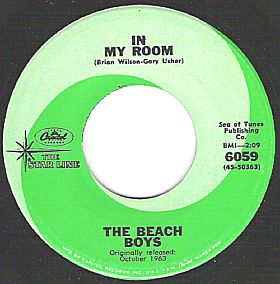
“In My Room” 45rpm single, shown on a later-edition “green swirl” label, 1965-67. Click for digital 'In My Room'.
“In My Room” was released as a single in October 1963 and remained on the Billboard Top 100 chart for eleven weeks, peaking at No. 23, although some charts and city surveys placed it higher. United Press International (UPI) had a weekly music survey in those days, which ranked it a No.17. In Boston and Seattle “In My Room” went to No. 1; in San Francisco, No. 2. It also reached the Top Ten in several other cities, including Washington, DC, Houston, Texas, Minneapolis, Minnesota; and Columbus, Ohio.
Singer David Crosby — no slouch when it comes to good harmony himself, and who performed memorably with The Byrds and Crosby, Stills, Nash and Young — is an admirer of this Beach Boys song. “‘In My Room’ was the defining point for me,” Crosby explained to one reporter. “When I heard it, I thought: ‘I give up; I can’t do that, I’ll never be able to do that’.” Rolling Stone magazine named the song No. 209 on its November 2004 list of “The 500 Greatest Rock n Roll Songs of All-Time.”
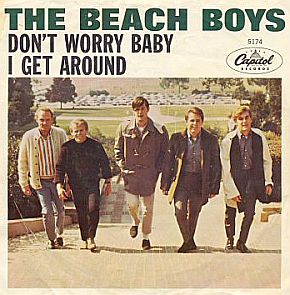
Cover sleeve for Beach Boys’ single “Don’t Worry Baby” w/ “I Get Around”. Click for digital 'I Get Around'.
March-May 1964
“Don’t Worry Baby”
In early 1964, the Beach Boys were having a pretty good year. This was an exceptional time for rock music generally. A prolific period of terrific “girl group” songs had just gone by — a genre that was still going strong with Martha and Vandellas and the Supremes.
Music Player
“Don’t Worry Baby”-1964
It was also a peak time for the Beatles’ rise in America — the British group that would dominate the charts in 1964. But the Beach Boys held their own in this period and then some as they turned out several songs that had exceptional harmonies, novel arrange- ment, and excellent production. Among these was “Don’t Worry Baby.”
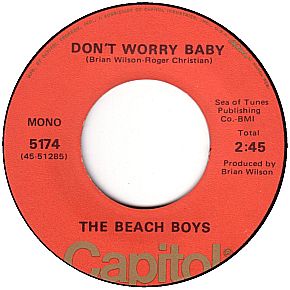
“Don’t Worry Baby” 45rpm on a later, 1970s issue “orange-gold" Capitol record label. Click for remastered digital version.
Brian Wilson had always been quite taken with the “wall-of-sound” production techniques of early 1960s studio whiz Phil Spector. Wilson was especially enamored of the sound Spector was getting on some of his “girl group” songs, such as “Be My Baby” by the Ronettes, which Wilson played incessantly when it first came out in 1963. According to some accounts, Wilson had written “Don’t Worry Baby” partly in answer to that song, and had in fact gone to Spector’s production studio in L.A. offering the song as a response to “Be My Baby.” Spector did not accept the song, to the good fortune of history and the Beach Boys.
Among other credits, “Don’t Worry Baby” is said to have influenced John Lennon’s 1980 hit, “(Just Like) Starting Over,” and is also used prominently in the 2006 film thriller, Déjà Vu. “Don’t Worry Baby” is listed among the Rock and Roll Hall of Fame’s “500 Songs That Shaped Rock and Roll.” It was also ranked 176th by Rolling Stone magazine in its November 2004 list of “The 500 Greatest Songs of All Time.”
July 1964
“All Summer Long”
Another 1964 song by the Beach Boys that has outstanding sound and production values is “All Summer Long” written by Brian Wilson and Mike Love. However, this song was not released as a single in 1964. It was first heard on the Beach Boys’ July 1964 album by that same name, All Summer Long, their sixth studio album. The song “All Summer Long” was the second track on the album.Music Player
“All Summer Long”-1964
In the U.K., the song was later released as a single in February 1965, but did not become a top hit there. Even in the U.S., apart from being on the album, the song did not become that well known, making it perhaps one of the more neglected Beach Boys’ songs of that era, yet still among their best work. One noteworthy fan of the song is film-maker George Lucas, who gave it some notice when he used it as background music over the end credits of his 1973 film, American Graffiti, his ode to the happy days of early 1960s’ rock ‘n roll.
In a review of this song for AllMusic.com, Donald A. Guarisco found it to be one of the classic examples of “sunshine pop” and of Brian Wilson helping to create the California Myth — “an idyllic dream world of sun, surf, and fun that created a potent mental escape hatch for many listeners.”The lyrics of “All Summer Long” tell a story of a happy summer of sharing between a guy and his girl. Yet the lyrics seem almost secondary to the song’s smooth musical power, its upbeat tone, and a kind of “take-you-away” easy listening. The harmonies are outstanding, and the buoyant instrumentation includes piano and some perfectly positioned xylophone. The All Summer Long album hit No. 4 on the Billboard charts and had a 49-week stay there. This also occurred during the peak of the 1960s “British invasion” of the U.S. music scene.
Aug-Sept 1964
“When I Grow Up”
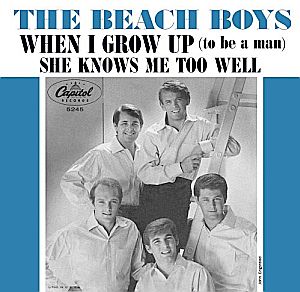
One of the record sleeve versions for the 1964 Beach Boy’s single, “When I Grow Up (To Be a Man)” with “She Knows Me Too Well” on B-side. Click for remastered 'When I Grow Up'.
The instrumental track, arranged by Brian Wilson, features Carl Wilson on lead and rhythm guitars; Al Jardine on electric bass guitars; Brian Wilson on acoustic piano and harpsichord; Carrol Lewis on harmonica; and Dennis Wilson on drums. Mike Love and Brian Wilson share the lead vocals with backing by all five members of the group.
Music Player
“When I Grow Up”-1964
“When I Grow Up” was released as a single on August 24th, 1964 with “She Knows Me Too Well” on the B side. It rose to No. 9 on the Billboard Hot 100 chart and No. 7 on the Cash Box list. It also spent two weeks at No 1. on Canada’s national RPM chart (i.e., RPM Magazine, “Records, Promotion, Music”). The song was also released on the group’s 1965 album, The Beach Boys Today!
This song was rarely performed live by the Beach Boys. However, on their first British tour in 1964 they did perform it, as well as “I Get Around,” on the U.K. TV show, Ready Steady Go.
“When I Grow Up” is one of those Beach Boys songs in which Brian Wilson takes on some of his own and his teen audience’s psychological concerns — namely facing adulthood and growing up. It is a simple song about a young teen thinking about what he’ll be like in the years ahead as he grows older, with a background refrain of the boys in chorus counting off the ascending years — credited as an “effective hook” by All Music reviewer Matthew Greenwald. Greenwald adds that the song is: “Buttressed by a fine series of harpsichord runs — clearly thought of during the songwriting and not the arranging process — an early example of Brian Wilson thinking about arrangements during the song’s construction.” This song was a precursor of things to come in Wilson’s later arranging of more complex Beach Boys’ music. In recent years, “When I Grow Up” has also been used in the opening credits of the cable TV show, Men of Certain Age, a U.S. comedy-drama about three best friends in their late forties dealing with the realities of middle age. The show premiered on TNT in early December 2009 starring Ray Romano, Andre Braugher and Scott Bakula.
Mar-Nov 1964
“Warmth of the Sun”
“The Warmth of the Sun” is a song written by Brian Wilson and Mike Love. It was first heard on the Beach Boys’ March 2nd, 1964 album, Shut Down Volume 2. Later released as the B-side of the “Dance, Dance, Dance” single on October 26th, 1964, “The Warmth of Sun” charted at No. 8 in the U. S. and No. 24 in the U.K. Brian Wilson produced both the song and the Shut Down Volume 2 album. He also sang lead vocals on the song.Music Player
“The Warmth of the Sun”-1964
Although it is commonly reported that “The Warmth of The Sun” was written on the evening of President John F. Kennedy’s assassination, and was inspired, at least partly by that tragic event, it appears there is somewhat more context to the song’s origins and writing. Mike Love and Brian Wilson had begun working on the song before November 22, 1963, and both had been involved in love relationships that had soured — personal experiences which appear to have figured into the song’s phrasing and its central message.
Brian Wilson at that time had just broken up with his first serious girlfriend. And Mike Love had also noted in one account of writing the lyrics from the perspective of a changed relationship: “Yes, things have changed and love is no longer there, but the memory of it is like the warmth of the sun…”
In November 2013, fifty years after he an Brian worked on the song, Mike Love wrote a piece at the HuffingtonPost.com recounting how the two put the song together, describing a session at Brian’s house on the evening of November 21st, 1963: that the focus of the song was about lost love and its lingering effect, and that a hurtful love experience, though painful, was still worth it. During this session – which ended at 2 a.m. by Mike’s account (i.e., on November 22nd) – there was deep sadness that permeated the session, or, as Mike has noted in other accounts, “a very mystical, eerie feeling associated with writing the song before we went to sleep.” Later that morning, according to Mike, after they had slept following their session, they learned about JFK’s assassination.
“… In the weeks that followed,” Mike writes, “that song written in the wee hours of November 22nd was recorded in a studio charged with emotion. I’ll never be able to hear or perform that song without recalling the loss of President Kennedy fifty years ago….” And again, in a 2016 YouTube.com podcast with former Los Angeles disc jockey, Wink Martindale, Mike Love, answering a question about the JFK connection, states: “…[W]hen we did record the song a couple of weeks after we [wrote it ] it was charged with that extra emotion that that event [i.e., the assassination ]…embodied in us. But we didn’t change the lyrics to conform to that horrible event. But definitely the emotion of that time and that incident were with us when we recorded….”
Brian Wilson had stated in earlier liner notes of writing the song, along with Mike, “in honor of President John F. Kennedy.” In his 2016 biography written with Ben Greenman – I Am Brian Wilson: A Memoir (DeCapo Press) – Brian also stated that the song was written on the day of the assassination and in response to it. Yet, one article at Forgotten Hits.com explores the writing of this song in some detail, with somewhat differing accounts as to when and where, since the Beach Boys were performing at the time in Marysville, California. In any case, the song may well have been dedicated to JFK, or offered in his honor, but its content appears to be about being at peace after losing, and learning from, a love relationship. “The Warmth of the Sun” was recorded in January 1964.
The Beach Boys’ “The Warmth of the Sun” is also featured on the film soundtrack for Good Morning, Vietnam (1987), starring Robin Williams, a soundtrack which also includes two other Beach Boys songs, “I Get Around” and “Don’t Worry, Baby”.
May-Sept 1966
“God Only Knows”
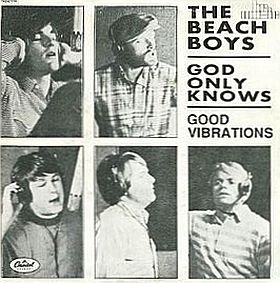
Record sleeve cover for 7" vinyl version of “God Only Knows” with “Good Vibrations” issued in 1977, The Netherlands. Click for digital 'God Only Knows'.
Music Player
“God Only Knows”-1966
Musically, the song — coming from the Pet Sounds oeuvre — is more technically sophisticated than much of the earlier Beach Boys’ work, or that of other pop groups in the mid-1960s. The song has a complicated melodic structure and layered vocal harmonies which some have described as “brilliantly arranged.” In producing the song, Brian Wilson also used instruments not typically used in rock compositions, including the harpsichord and French horns, heard in the introduction.
Wilson also took other risks with this song, as it was one of the first to use the word “God” in its title. There were fears at the time — 1966 — that using such a title would hurt the song’s radio airplay and that it would also bring religious group protest, some of which did occur. On the other hand, there were also concerns that given the song’s religious-sounding title, the hipper kids of that day might reject “God Only Knows” as “too square.”
Laura Barton, writing about the song years later for The Guardian newspaper of London in 2009, observed that the use of “God” was perfectly appropriate, given “the jump into the unknown required to fall in love” in the first place. It echoes “the leap of faith necessary to believe in God,” she wrote. And other lyrics in the song, she added, also cite “godly creations: the stars above,” “the world that turns,” and that “life that goes on” — all affirmations of faith and belief at some level.The song’s biggest fans, in turns out, are other musicians. Former Beatle Paul McCartney has called it one of the greatest songs ever. Jimmy Webb, an American pop music composer known for songs such as: “Up, Up and Away”, “By the Time I Get to Phoenix”, “Wichita Lineman”, “Galveston” and “MacArthur Park,” is also a fan of this song, calling it “a bow to the baroque that goes all the way back to 1740 and J.S. Bach.” Webb adds that the song represents “the whole tradition of liturgical music that I feel is a spiritual part of Brian’s music. And Carl’s singing is pretty much at its pinnacle — as good as it ever got.” One TV use of “God Only Knows” as background music riled up at least one fan who charged “manipu- lation” and “rape” of the song’s brilliance.Bono, the frontman for the Irish rock band U2, spoke in praise of the song’s string arrangement during Brian Wilson’s October 2006 induction into the U.K. Music Hall of Fame, calling that part of the song “fact and proof of angels.”
“God Only Knows” — a popular selection for weddings — has also found its way into contemporary film and television. It is heard, for example, near the end of the 2003 British romantic comedy Love Actually, a film about the different aspects of love as shown through ten separate stories starring Hugh Grant, Emma Thompson, Laura Linney, Liam Neeson and others. The song has also been used in films with Christian themes, such the 2004 TV drama Saved. During 2006-2009, the song was used as the primary theme song for Big Love, the American TV drama on HBO (Tom Hanks, executive producer) — a series about a fictional fundamentalist Mormon family in Utah who practice polygamy, starring Bill Paxton and others. “God Only Knows” ran as Big Love‘s musical theme for the first three seasons, or more than 30 episodes. Some fans of “God Only Knows,” however, were not happy with the song’s use in this series. One writer, Adam Baer, at the Glass Shallot blog, observed, for example:
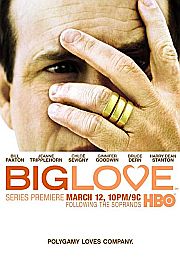
A promotional poster for "Big Love," the cable TV show that used "God Only Knows" as a theme song for a time. Click for complete series DVD.
“…[B]y attaching a song like this to a manipulative soap opera like “Big Love”… the producers of the show have attached fictional scenes and pictures and characters and themes to this song. When we hear “God Only Knows” now, it’s hard for watchers of the show to separate it from “Big Love.” It’s just too famous and so-called “absolute” a song for it to be victimized by such semantic manipulation….”
“Look: We (fans) don’t own the song any more than “Big Love” does–in fact, we own it less because “Big Love” likely paid Brian Wilson and the Beach Boys a princely sum to use the music. I know that. But we also don’t broadcast to the world images of our lives–or worse, our lame narratives–with “God Only Knows” in the background. We don’t rape the song of its absolute brilliance–of its ability to mean something different to different people–and render it a semiotic aid for one particular narrative that needs a lot of help…”
In London, on the other hand, Laura Barton of The Guardian, praising “God Only Knows” in a 2009 review, found at least one TV use acceptable. Calling the song “one of those shimmeringly perfect love songs,” she pointed to its use in a lost adolescent love scene in the American TV show Wonder Years (1988-1993) as being perfectly apropos, where the song was simpatico with the on-screen drama of the principal character losing the long-loved girl next door. Beyond this, Barton also observes of the song generally:
“God Only Knows” is not just about the “billing and cooing” of love, as one critic put it, but also its highs and lows; the trepi- dations of love; its terrors and rewards…
“…Considering the fact that this is a song about devotion, its opening line has always been unsettling: ‘I may not always love you,’ Wilson sings, a sudden cloud of uncertainty in the music’s clear blue sky. Yet it is of course this very line that makes ‘God Only Knows’ truly extraordinary. This isn’t just a love song. It isn’t just about the billing and cooing, the early doveish days of courtship; it’s a song that recognizes the fact that falling in love is somehow terrifying, that you go into that love blindly, as Wilson put it, but that in that blindness you can see that you are who you are because of someone else.”
“God Only Knows” has also been rated highly in several “greatest song surveys” by music magazines such as Mojo. Some have also named it the best song of the 1960s. Rolling Stone placed the song at No. 25 on its list of “The 500 Greatest Songs of All Time.”
More background on the Beach Boys and their music is found in Part 1 of this article, “Early Beach Boys.” See also the film trailer and story at “Love & Mercy,” the 2015 film about Brian Wilson, his musical genius and his troubled soul. For more music stories at this website visit the “Annals of Music” category page. Thanks for visiting — and if you like what you see here, please make a donation to help support the research and writing at this website. Thank you. — Jack Doyle
|
Please Support Thank You |
________________________________
Date Posted: 14 June 2010
Last Update: 30 June 2022
Comments to: jdoyle@pophistorydig.com
Article Citation:
Jack Doyle, “Early Beach Boys, Pt. 2: Six Songs,”
PopHistoryDig.com, June 14, 2010.
________________________________
Sources, Links & Additional Information
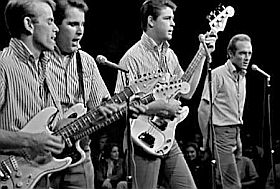 Beach Boys performing at the TAMI show, 1964. |
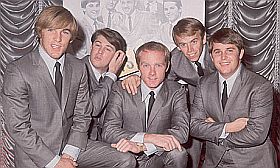 Beach Boys in more formal attire, 1964. |
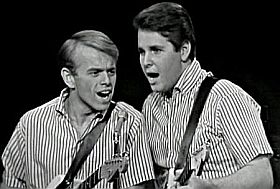 Al Jardine & Carl Wilson at TAMI show, 1964. |
“The Beach Boys,” in Holly George-Warren and Patricia Romanowski (eds), The Rolling Stone Encyclopedia of Rock & Roll, New York: Rolling Stone Press, 3rd Edition, 2001, pp.51-54.
Joel Whitburn, The Billboard Book of Top 40 Hits, Billboard Books, New York: Watson-Guptill Publications, 8th Edition, 2004, pp. 50-51.
“The Beach Boys,” The Rock and Roll Hall of Fame, Induction year, 1988.
Greg Panfile, “The Mind of Brian,” a series of detailed musical reviews of selected Beach Boys’ songs.
G. Cooksey and Ronnie Lankford, “Brian Wilson,” Contemporary Musicians, Encyclo- pedia.com.
“The Beach Boys,” Wikipedia.org
Robert Fontenot, “Profile: The Beach Boys,” About.com.
John Bush, “The Beach Boys: Biography,” All Music.com.
Jim Miller, “The Beach Boys” in, Anthony DeCurtis and James Henke (eds), The Rolling Stone Illustrated History of Rock n Roll, New York: Random House, 1992, p 194.
Billy Altman, “For the Beach Boys, It Wasn’t All Platinum,” New York Times, July 25, 1993.
ABC Television, Mini-series Docu-Drama, The Beach Boys: An American Family, aired, February 2000.
Richard Corliss, “That Old Feeling: Brian’s Songs,” Time, Saturday, June 30, 2001.
Kevin M. Cherry, “Still America’s Band(s): The Beach Boys Today,” National Review, July 8, 2002.
J. Freedom du Lac, “It Wasn’t All Fun, Fun, Fun: The Beach Boy’s Hymns to the Dream State of California Belied The Nightmare He Was Living,” Washington Post, Sunday, December 2, 2007, p. M-1.
Tom Moon, “Good Vibrations, The Beach Boys,” and “Pet Sounds, The Beach Boys,” 1,000 Recordings to Hear Before You Die, Workman Publishing: New York, 2008, pp. 54-55.
Matthew Greenwald, Song Review: “When I Grow Up (To Be a Man), The Beach Boys,” AllMusic.com.
Donald A. Guarisco, “Song Review: Beach Boys, All Summer Long,” AllMusic.com
“The True Story Behind the Beach Boys’ Classic Song ‘The Warmth of the Sun’,” Forgotten Hits.com.
Mike Love, “JFK and the Story Behind ‘The Warmth of the Sun’,” HuffingtonPost.com, November 21, 2013, updated January 25, 2014.
“Mike Love on ‘Warmth of the Sun,’ Brian Wilson, JFK Assassination,” YouTube.com,
posted by Professor Hamamoto, July 26, 2016.
“The Warmth of the Sun,” Wikipedia.org.
“16 Inspiring Songs That Honor JFK: The Beach Boys, ‘Warmth of the Sun’,” Rolling Stone, November 19, 2013.
Laura Barton, “Hail, Hail, Rock ‘n’ Roll: With God Only Knows, Brian Wilson Wrote the Ultimate Love Song,” The Guardian, Friday, April 3, 2009.
“God Only Knows How Big Love Got Away with It. Oh Yeah: Money,” GlassShallot, August 22, 2007
“The Beach Boys Top 25 Best Most-Overlooked Singles,” Talk AboutPop Music, Friday, October 30, 2009.
“Early Beach Boys Hit Song Topics,” #5 In A Series Of Pop-Cultural Charts, Danmeth. com, May 6, 2009.
“Surf, Rods, ‘n Honeys — Jan ‘n Dean, Part 2 of 5,” JanAndDean-JanBerry.com, viewed, May 2010.
Mark A. Moore, “A Righteous Trip: In the Studio with Jan Berry”, Dumb Angel Magazine, 2005.
“Beach Boys Will Appear July 3,” Los Angeles Times, June 22, 1965, p. C-8.
John L Scott, “Beach Boys Ride Crest of Teen Craze,” Los Angeles Times, June 28, 1965, p. C-15.
Art Seidenbaum, “The Beach Boys—Jivey in the Halls of Ivy,” Los Angeles Times, March 15, 1966, p. C-1.
Art Seidenbaum, “Beach Boys Riding the Crest of Pop-Rock Wave,” Los Angeles Times, March 20, 1966, p. B-17.
“Beach Boys” (re: March of Dimes benefit concert w/others at Merriweather Post Pavilion, Columbia, MD), Washington Post, Times Herald, July 27, 1969, p. F-7.
Tom Zito, “The Beach Boys Still Sound Good,”Washington Post, Times Herald, April 25, 1971.
Don Heckman, “Beach Boys Fans Here Demand The Old Hits, Not the New Ones,” New York Times, Sunday, September 26, 1971, p.78.
Henry Allen, “Beach Boys: Good Junk,” Washington Post, Times Herald, August 31, 1972, p. B-15.
Alex Ward, “The Beach Boys: A Rock ‘n ‘Roll Institution,” Washington Post, August 29, 1976.
Larry Rohter, “15 Years of Beach Boys,” Washington Post, January 21, 1977, p. B-8.
John Rockwell, “Beach Boys Turn Central Park Into California Dreamin,” New York Times, Friday, September 2, 1977, p. 19.
ABC-TV, Docu-drama miniseries, The Beach Boys: An American Family, February 2000.
Robbie Woliver, “Music; Finally Getting the Good Vibrations Back Again,” New York Times, September 3, 2000.
Peter Ames Carlin, “Music; A Rock Utopian Still Chasing An American Dream,” New York Times, March 25, 2001.
David Leaf, The Beach Boys and the California Myth, Grosset & Dunlap, 1978, paperback, 192 pp.
Brad Elliott, Surf’s Up! The Beach Boys on Record, 1961-1981, Pierian Press, 1992, hardcover,493 pp.
David Leaf, The Beach Boys, Courage Books, 1985, hardcover, 208 pp.
Steven Gaines, Heroes and Villains: The True Story of the Beach Boys, Dutton, 1986, hardcover, pp. 374
Brian Wilson with Todd Gold, Wouldn’t It Be Nice: My Own Story, Harper Collins, 1991.
Kingsley Abbott (ed.) Back to the Beach: A Brian Wilson and the Beach Boys Reader, Helter Skelter Publishing, October 2002, 256pp.
Charles L Granata, Wouldn’t It Be Nice: Brian Wilson and the Making of the Beach Boys’ Pet Sounds, Chicago: Chicago Review Press, 2003.
Andrew G. Doe, John Tobler, Brian Wilson and the Beach Boys: The Complete Guide to Their Music, Omnibus Press, 2004, 176 pp.
Peter Ames Carlin, Catch a Wave: The Rise, Fall, and Redemption of the Beach Boys’ Brian Wilson, Rodale Press, 2006, 336pp.
Philip Lambert, Inside the Music of Brian Wilson: The Songs, Sounds and Influences of the Beach Boys’ Founding Genius, Paperback, Continum Press, Illustrated edition, March 2007, 404 pp.
The Beach Boys and Wolf Marshall, The Beach Boys Definitive Collection: A Step-By-Step Breakdown of Their Guitar Styles and Techniques, Hal Leonard Corp., 2002, 64 pp.
Phil Gallo, “Hall of Fame Flashback: The Beach Boys,” Fender.com.
Beach Boys album covers & single sleeves, Sergent.com.
Film, Brian Wilson: A Beach Boys Story, A&E Biography Series,1999, running time: 100 minutes.
_______________________
